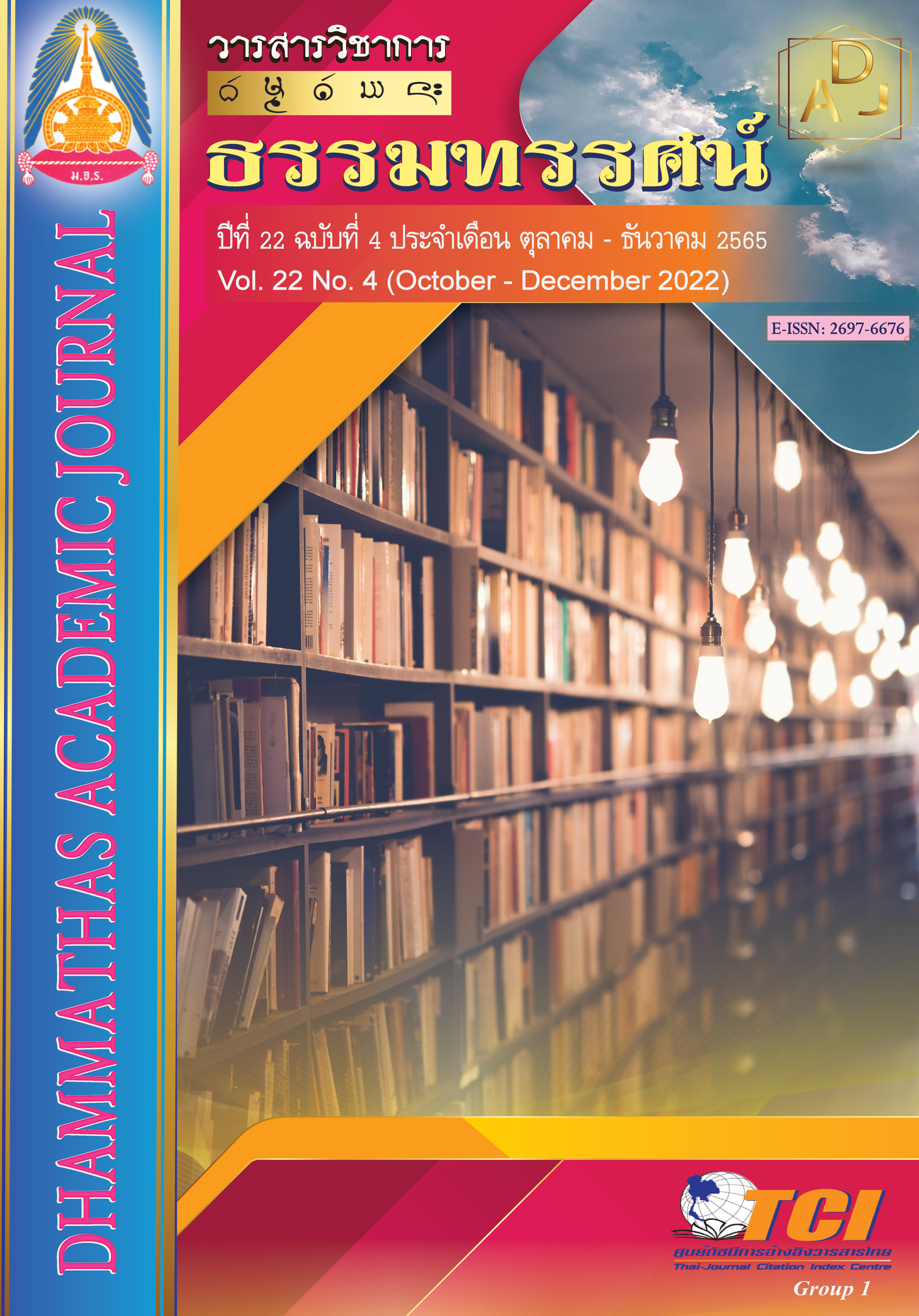An analysis of Ethics Teaching Development in Education Curriculum of Thailand
Main Article Content
Abstract
Ethics is one of the important elements that states must include during circumstances, instruction in order for citizens to learn and understand ethics. The purpose of this article is to analyze the development of teaching ethics in Thai education curricula. The analytical study, it was found that the development of Thai ethical curricula can be divided into 6 periods although other ethical concepts were later incorporated but it is only to create harmony and link with Buddhist principles. It has also been found that ethical principles are applied in accordance with contemporary circumstances but we also found that the ethical teaching of Thai education courses only trains citizens to be ethical obedience. It is not yet a teaching to understand ethical principles.
Article Details

This work is licensed under a Creative Commons Attribution-NonCommercial-NoDerivatives 4.0 International License.
เพื่อให้เป็นไปตามกฎหมายลิขสิทธิ์ ผู้นิพนธ์ทุกท่านต้องลงลายมือชื่อในแบบฟอร์มใบมอบลิขสิทธิ์บทความ ให้แก่วารสารฯ พร้อมกับบทความต้นฉบับที่ได้แก้ไขครั้งสุดท้าย นอกจากนี้ ผู้นิพนธ์ทุกท่านต้องยืนยันว่าบทความ ต้นฉบับที่ส่งมาตีพิมพ์นั้น ได้ส่งมาตีพิมพ์เฉพาะในวารสาร วิชาการธรรม ทรรศน์ เพียงแห่งเดียวเท่านั้น หากมีการใช้ ภาพหรือตารางของผู้นิพนธ์อื่นที่ปรากฏในสิ่งตีพิมพ์อื่นมาแล้ว ผู้นิพนธ์ต้องขออนุญาตเจ้าของลิขสิทธิ์ก่อน พร้อมทั้ง แสดงหนังสือที่ได้รับการยินยอมต่อบรรณาธิการ ก่อนที่บทความจะได้รับการตีพิมพ์References
กรมวิชาการ กระทรวงศึกษาธิการ. (2518). คู่มือหลักสูตรประโยคมัธยมศึกษาตอนปลาย พุทธศักราช 2518. กรุงเทพฯ: กระทรวงศึกษาธิการ.
_______. (2536). หลักสูตรประถมศึกษา พุทธศักราช 2521 (ปรับปรุง พ.ศ. 2533). กรุงเทพฯ: กระทรวงศึกษาธิการ.
_______. (2551). หลักสูตรแกนกลางการศึกษาขั้นพื้นฐาน พุทธศักราช 2551. กรุงเทพฯ: กระทรวงศึกษาธิการ.
_______. (2554). หลักสูตรแกนกลางการศึกษาขั้นพื้นฐาน พุทธศักราช 2554. กรุงเทพฯ: กระทรวงศึกษาธิการ.
ดนัย ปรีชาเพิ่มประสิทธิ์. (2549). หลักสูตรการศึกษาพระพุทธศาสนาในโรงเรียนไทย: รุ่งเรืองหรือร่วงโรย. วารสารศิลปศาสตร์ มหาวิทยาลัยธรรมศาสตร์, 6(2), 128-159.
เด่นพงษ์ แสนคำ. (2561). การสร้างแนวคิดชาตินิยมไทยผ่านทางการศึกษาวัฒนธรรมและงานนิพนธ์. วารสารนานาชาติมหาวิทยาลัยขอนแก่น สาขามนุษยศาสตร์และสังคมศาสตร์, 8(3), 142-168.
นววรรณ วุฒฑะกุล. (2550). แผนการศึกษาแห่งชาติ หลักสูตร และการจัดการเรียนการสอนในระดับการศึกษาขั้นพื้นฐานตั้งแต่รัชสมัยพระบาทสมเด็จพระจุลจอมเกล้าเจ้าอยู่หัวถึงสิ้นสุดยุคสมบูรณาญาสิทธิราชย์. (รายงานการวิจัย). กรุงเทพฯ: จุฬาลงกรณ์มหาวิทยาลัย.
ปวีณา วังมี. (2543). รัฐไทยกับการกล่อมเกลาทางการเมืองผ่านแบบเรียนในช่วง พ.ศ. 2475-2487. (วิทยานิพนธ์อักษรศาสตรมหาบัณฑิต). กรุงเทพฯ: จุฬาลงกรณ์มหาวิทยาลัย.
พุทธรักษ์ ปราบนอก. (2560). การสอนศาสนา ศีลธรรมและจริยธรรมในโรงเรียนประถมศึกษาของประเทศไทย. วารสารมนุษยศาสตร์และสังคมศาสตร์, 34(3), 269-287.
วรัฏรยา หุ่นเจริญ. (2545). โรงเรียนในสมัยรัชกาลที่ 5 และรัชกาลที่ 6 (พ.ศ. 2411-2468). (วิทยานิพนธ์สถาปัตยกรรมศาสตรมหาบัณฑิต). กรุงเทพฯ: มหาวิทยาลัยศิลปากร.
วัชรินทร์ มัสเจริญ. (2533). แบบเรียนสังคมศึกษากับการกล่อมเกลาทางการเมืองไทย ในสมัยจอมพลสฤษดิ์ ธนะรัชต์: ศึกษากรณีความมั่นคงของสถาบันชาติ ศาสนา และพระมหากษัตริย์. (วิทยานิพนธ์อักษรศาสตรมหาบัณฑิต). กรุงเทพฯ: จุฬาลงกรณ์มหาวิทยาลัย.
วิทย์ วิศทเวทย์. (2526). ปรัชญาการศึกษาไทย 2411-2475. กรุงเทพฯ: สำนักงานคณะกรรมการการศึกษาแห่งชาติ.
โสภา ปาลบุตร. (2475). แบบสอนอ่านหน้าที่ราษฎร. พระนครศรีอยุธยา: โรงเรียนช่างพิมพ์วัดสังเวช.
Cromdal, J. (2006). Socialization. In Brown, K. (Eds.). Encyclopedia of language and linguistics. North-Holland: Elsevier.
Halstead, J. M. (2010). Moral Education. In Clauss-Ehlers C.S. (Eds). Encyclopedia of Cross-Cultural School Psychology (pp. 260-265). Boston: Springer.
Klechaya, R. & Glasson, G. (2017). Mindfulness and place-based education in buddhist-oriented schools in Thailand. In Powietrzyńska, M., & Tobin, K. (Eds.). Weaving complementary knowledge systems and mindfulness to educate a literate citizenry for sustainable and healthy lives (pp. 159-170). Brill Sense: Springer.
Lockwood, J. H. (1999). The Moral of the Story: Content, Process, and Reflection in Moral Education through Narratives. La Vergne, TN: Dissertation Com.
Russell, D. C. (2013). Virtue ethics, happiness, and the good life. In Russell, D. C. (Eds.). The Cambridge companion to virtue ethics (pp. 7-28). Oxford: Cambridge University Press.
Singsuriya, P., Aungsumalin, W. & Worapong, S. (2014). Narrative approach to moral education: A case of Thailand. Education, Citizenship and Social Justice, 9(3), 209-225.
Tirri, K. (1999). Teachers' perceptions of moral dilemmas at school. Journal of Moral Education, 28(1), 31-47.

